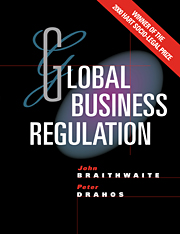5 - Conclusions
Published online by Cambridge University Press: 04 August 2020
Summary
There are important contextual conclusions in each chapter about the globalization of each specific domain of regulation. Clearly, what is true of the regulation of finance (Chapter 8, which covers monetary policy, banking, tax and insurance), is very different from what is true of drugs (Chapter 15, which covers prescription drugs, over-the-counter drugs, illicit drugs, alcohol and tobacco). Indeed, it follows from our ‘webs of influence’ model that each web is contextually complex and paradoxical and therefore requires less a law-like understanding and more a clinical diagnosis of when a particular web tightens or unravels. Although contextual understanding is ultimately the most useful, we have forty-four things of general import to say
The Process of Globalization
Powerful Actors
1 The US state has been by far the most influential actor in accomplishing the globalization of regulation. Today the European Commission (EC) is beginning to approach US influence. When the US and EC can agree on which direction global regulatory change should take, that is usually the direction it does take. Japan's influence is remarkably weak.
2 States have always been objects as well as subjects of regulation, regulators and regulatees. States were regulated by the Fuggers in the sixteenth century, the British East India Company in the eighteenth century, the Rothschilds until the 1930s, and today by business organizations like the Big Five accounting firms, IATA, the Société Générale de Surveillance, Moody's and Standard & Poor's plus international organizations like the IMF and World Bank. In 1999, British mercenary corporation Sandline International, in a dispute over its involvement in the war in Bougainville, took legal action to freeze various overseas funds of the Papua New Guinea government in order to chill its capacity for overseas borrowing.
3 The most recurrently effective actors in enrolling the power of states and the power of the most potent international organizations (e.g. the WTO and IMF) are large US corporations.
4 The ICC is an important actor in the globalization of regulation because, in addition to having an interest-group strategy for shaping regulation, for seventy years it has had a private ordering strategy based on recording its members’ customary practices and releasing them in the form of model rules and agreements.
- Type
- Chapter
- Information
- Global Business Regulation , pp. 27 - 33Publisher: Cambridge University PressPrint publication year: 2000
- 1
- Cited by



